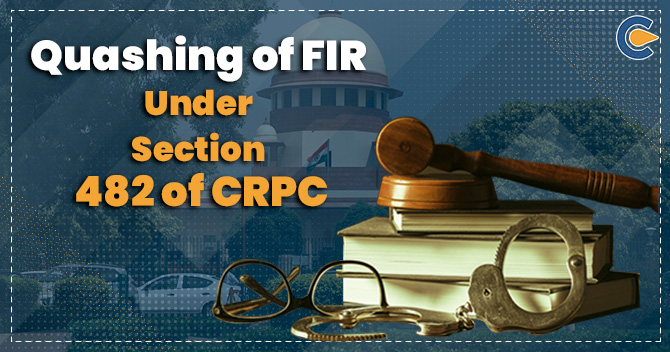Quashing of FIR
Quashing a FIR essentially means canceling the First Information Report and stopping the legal proceedings initiated based on someone’s complaint. A quashing petition is filed under Section 482 of the Criminal Procedure Code (CrPC), which allows the High Court to use its inherent powers to ensure justice and prevent the misuse of legal processes.
The Code of Criminal Procedure, 1973, elucidates inherent powers of High Court under Section 482 [1] as follows:
- Section 482 enumerates that a High Court has got the power to act in any manner in order to make the two ends of justice meet.
- Under this section, a High Court has the power to quash an FIR if it thinks that the FIR which has been lodged is a false one and was done with malicious intention to trouble the aggrieved person.
- If any person has been implicated and accused of a non-compoundable offence then he can approach a High Court and file a Writ Petition under Article 226 of the Indian Constitution read with Section 482 of CrPC.
- The burden of proof is on the petitioner to prove that he FIR has been lodged only for malicious reasons and to trouble the petitioner.
When an individual is acquitted, they have various rights:
- Initiating Criminal Charges: The acquitted person can request the court to file criminal charges against the complainant once the FIR is quashed and they are discharged from the case.
- Filing Complaints for False Information: A complaint under Section 182 of the Indian Penal Code (IPC) can be filed against anyone who provided false information with malicious intent.
- Compensation under Section 250 CRPC: The acquitted person can file for compensation under Section 250 of the CrPC for baseless accusations that caused harm. This applies to cases involving summons and warrants.
- Rights Against Public Servants: In certain situations, the acquitted person can take legal action against a public servant who misused their power to harass them.
In the landmark judgment of State of Haryana v. Bhajan Lal 1992 AIR 604, the Supreme Court outlined seven categories in which the court can quash criminal proceedings:
- Insufficient Allegations: When the allegations in the FIR, even if accepted entirely, do not prima facie establish any offense against the accused.
- Lack of Cognizable Offense: When the allegations in the FIR and accompanying materials do not reveal a cognizable offense, justifying police investigation under Section 156(1) of the Code, unless ordered by a Magistrate as per Section 155(2) of the Code.
- Failure to Disclose Offense: When the allegations in the FIR and supporting evidence do not disclose the commission of an offense or establish a case against the accused.
- Non-Cognizable Offense: When the FIR alleges a non-cognizable offense, and no police investigation is allowed without a Magistrate’s order under Section 155(2) of the Code.
- Absurd Allegations: When the allegations in the FIR are so absurd that no reasonable person could conclude that there are sufficient grounds to proceed against the accused.
- Legal Bar: When there is an explicit legal prohibition in the Code or the relevant Act, preventing the initiation or continuation of criminal proceedings, or when the Code or Act provides an effective remedy for the aggrieved party.
- Malicious Intent: When a criminal proceeding is evidently motivated by malicious intent or is maliciously instituted with an ulterior motive, such as seeking revenge or settling a personal grudge against the accused.
In summary, quashing the FIR opens up avenues for the acquitted person to seek justice, file complaints against false accusers, and pursue compensation for unwarranted legal actions.
Adv. Bhavesh Jangra


A cornerstone of our community.
can i get generic lisinopril without insurance
Their global medical liaisons ensure top-quality care.
They maintain a high standard of hygiene and cleanliness.
where can i buy generic cytotec without a prescription
A pharmacy that takes pride in community service.
They simplify global healthcare.
gabapentin and 100mg and dosage
Their global pharmacists’ network is commendable.
Consistently excellent, year after year.
order cheap clomid for sale
This pharmacy has a wonderful community feel.